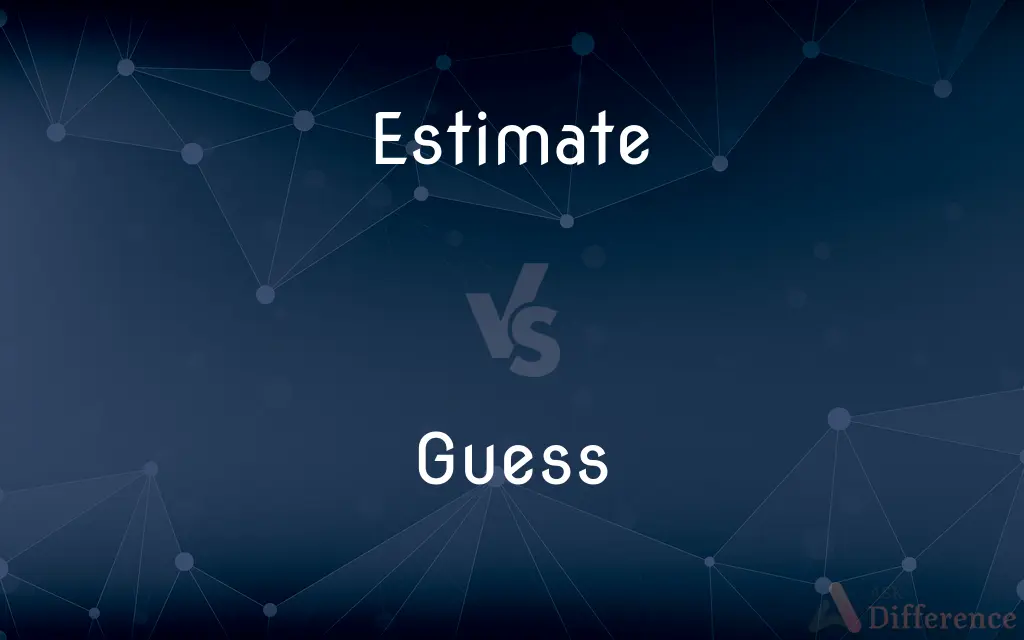Estimate vs. Guess — What's the Difference?
By Maham Liaqat & Fiza Rafique — Updated on March 21, 2024
Estimate involves a calculated approximation based on data or knowledge, while a guess is often a spontaneous conjecture with little to no information.

Difference Between Estimate and Guess
Table of Contents
ADVERTISEMENT
Key Differences
Estimating typically involves some degree of calculation or informed reasoning, incorporating known data or previous experience to arrive at a figure or conclusion that is close to the actual value. This process is often used in professional settings, like project management or budgeting, where a reasonable degree of accuracy is necessary. Guessing, on the other hand, lacks a solid basis in data or detailed analysis and is more akin to conjecture or speculation. It's more common in casual contexts or when information is scarce, and precision is not crucial.
The degree of accuracy expected from an estimate is usually higher than that from a guess. Estimates are often accompanied by a range or a degree of confidence, reflecting the estimator's understanding of the underlying variables and their potential impact. In contrast, guesses do not typically come with such qualifications, as they are understood to be more haphazard and less reliable.
The methodology behind an estimate is usually transparent and can be explained or justified by the data and assumptions used. This allows others to understand the reasoning, challenge assumptions, or offer improvements. Guesses, however, are subjective and personal, often based on intuition or arbitrary judgment, making them harder to analyze or critique in a meaningful way.
The use of each approach varies by context. Estimates are favored in professional, academic, or technical environments where decisions are based on data and informed predictions are valued. Guesses are more likely in informal settings, games, or situations where the stakes are low and the emphasis is on speed or fun rather than accuracy.
Comparison Chart
Basis
Data, knowledge, and informed reasoning
Conjecture, often with little to no information
ADVERTISEMENT
Accuracy
Generally higher, with possible confidence range
Typically lower, more speculative
Methodology
Transparent, can be explained or justified
Subjective, based on personal intuition
Context of Use
Professional, technical, academic settings
Casual, informal settings or low-stakes decisions
Expectation of Reliability
Expected to be reasonably accurate
Not expected to be accurate
Compare with Definitions
Estimate
An approximate calculation or judgment of the value, number, quantity, or extent of something.
The contractor provided an estimate for the renovation costs.
Guess
An attempt to answer a question or make a prediction without sufficient information to be certain of being correct.
I had to guess the answer to the final quiz question.
Estimate
A statement of the approximate charge for work to be done, submitted by a vendor or contractor.
We requested estimates from several painters before deciding.
Guess
A spontaneous or casual conjecture without firm evidence.
It's just a guess, but I think she'll say no.
Estimate
The process of making an informed guess based on available data.
He made a quick estimate of the crowd size at the concert.
Guess
The act of selecting an option or decision based on intuition rather than evidence.
We guessed at the best path to take through the woods.
Estimate
An appraisal of an item's value, especially for insurance or sale.
The antique vase was taken to an expert for an estimate of its worth.
Guess
An estimate made without any significant basis or data to support it.
My guess is that the project will take about two weeks to complete.
Estimate
A document detailing the projected costs of a project or service.
The architect's estimate outlined the budget for the new building.
Guess
The process or instance of predicting an outcome without substantial justification.
Making a guess, he chose the blue door over the red.
Estimate
To calculate approximately (the amount, extent, magnitude, position, or value of something).
Guess
To predict (a result or an event) without sufficient information.
Estimate
To form an opinion about; evaluate
"While an author is yet living we estimate his powers by his worst performance" (Samuel Johnson).
Guess
To assume, presume, or assert (a fact) without sufficient information.
Estimate
A tentative evaluation or rough calculation, as of worth, quantity, or size
An estimate of the damage caused by the storm.
Guess
To form a correct estimate or conjecture of
Guessed the answer.
Estimate
A statement of the approximate cost of work to be done, such as a building project or car repairs.
Guess
To suppose; think
I guess he was wrong.
Estimate
A judgment based on one's impressions; an opinion
I have a high estimate of his character.
Guess
To make an estimate or conjecture
We could only guess at her motives.
Estimate
A rough calculation or assessment of the value, size, or cost of something.
Guess
To estimate or conjecture correctly.
Estimate
(construction and business) A document (or verbal notification) specifying how much a job is likely to cost.
Guess
An act or instance of guessing.
Estimate
An upper limitation on some positive quantity.
Guess
A conjecture arrived at by guessing.
Estimate
To calculate roughly, often from imperfect data.
Guess
To reach a partly (or totally) unqualified conclusion.
Estimate
To judge and form an opinion of the value of, from imperfect data.
Guess
To solve by a correct conjecture; to conjecture rightly.
He who guesses the riddle shall have the ring.
Estimate
To judge and form an opinion of the value of, from imperfect data, - either the extrinsic (money), or intrinsic (moral), value; to fix the worth of roughly or in a general way; as, to estimate the value of goods or land; to estimate the worth or talents of a person.
It is by the weight of silver, and not the name of the piece, that men estimate commodities and exchange them.
It is always very difficult to estimate the age in which you are living.
Guess
To suppose (introducing a proposition of uncertain plausibility).
That album is quite hard to find, but I guess you could try ordering it online.
Estimate
To from an opinion of, as to amount,, number, etc., from imperfect data, comparison, or experience; to make an estimate of; to calculate roughly; to rate; as, to estimate the cost of a trip, the number of feet in a piece of land.
Guess
(colloquial) To think, conclude, or decide (without a connotation of uncertainty). Usually in first person: "I guess".
"I guess you were right." "What did he say?" "He guesses you were right."
"I guess I'll go to bed."
Estimate
A valuing or rating by the mind, without actually measuring, weighing, or the like; rough or approximate calculation; as, an estimate of the cost of a building, or of the quantity of water in a pond.
Weigh success in a moral balance, and our whole estimate is changed.
No; dear as freedom is, and in my heart'sJust estimation prized above all price.
Guess
(obsolete) To hit upon or reproduce by memory.
Estimate
An approximate calculation of quantity or degree or worth;
An estimate of what it would cost
A rough idea how long it would take
Guess
A prediction about the outcome of something, typically made without factual evidence or support.
If you don't know the answer, take a guess.
Estimate
A judgment of the qualities of something or somebody;
Many factors are involved in any estimate of human life
In my estimation the boy is innocent
Guess
To form an opinion concerning, without knowledge or means of knowledge; to judge of at random; to conjecture.
First, if thou canst, the harder reason guess.
Estimate
A document appraising the value of something (as for insurance or taxation)
Guess
To judge or form an opinion of, from reasons that seem preponderating, but are not decisive.
We may then guess how far it was from his design.
Of ambushed men, whom, by their arms and dress,To be Taxallan enemies I guess.
Estimate
A statement indicating the likely cost of some job;
He got an estimate from the car repair shop
Guess
To solve by a correct conjecture; to conjecture rightly; as, he who guesses the riddle shall have the ring; he has guessed my designs.
Estimate
The respect with which a person is held;
They had a high estimation of his ability
Guess
To hit upon or reproduce by memory.
Tell me their words, as near as thou canst guess them.
Estimate
Judge tentatively or form an estimate of (quantities or time);
I estimate this chicken to weigh three pounds
Guess
To think; to suppose; to believe; to imagine; - followed by an objective clause.
Not all together; better far, I guess,That we do make our entrance several ways.
But in known images of life I guessThe labor greater.
Estimate
Judge to be probable
Guess
To make a guess or random judgment; to conjecture; - with at, about, etc.
This is the place, as well as I may guess.
Guess
An opinion as to anything, formed without sufficient or decisive evidence or grounds; an attempt to hit upon the truth by a random judgment; a conjecture; a surmise.
A poet must confessHis art 's like physic - but a happy guess.
Guess
A message expressing an opinion based on incomplete evidence
Guess
An estimate based on little or no information
Guess
Expect, believe, or suppose;
I imagine she earned a lot of money with her new novel
I thought to find her in a bad state
He didn't think to find her in the kitchen
I guess she is angry at me for standing her up
Guess
Put forward, of a guess, in spite of possible refutation;
I am guessing that the price of real estate will rise again
I cannot pretend to say that you are wrong
Guess
Judge tentatively or form an estimate of (quantities or time);
I estimate this chicken to weigh three pounds
Guess
Guess correctly; solve by guessing;
He guessed the right number of beans in the jar and won the prize
Common Curiosities
What is an informed estimate?
An informed estimate is based on data, previous experiences, and logical reasoning to approximate a value.
Do professionals rely on guesses?
While professionals may occasionally make guesses, they typically rely on estimates when accuracy is important.
How can one improve their estimating abilities?
Improving estimating abilities involves gaining more knowledge, understanding the context, and learning from past experiences.
Can a guess ever be accurate?
Yes, a guess can sometimes be accurate, but it lacks a reliable basis, making such accuracy coincidental.
Is estimating a skill?
Yes, estimating is a skill that can be developed with practice and knowledge, particularly in fields requiring precision.
What role do assumptions play in estimates?
Assumptions provide a foundation for estimates, defining the conditions under which the estimate is considered valid.
Why is transparency important in estimates?
Transparency allows others to understand the basis of the estimate, fostering trust and enabling informed decision-making.
Are all estimates correct?
Estimates are approximations and can be subject to errors, but they aim to be as close to the actual value as possible.
How do experts make better guesses?
Experts may make more accurate guesses due to their deeper knowledge and experience in a specific field, though these are still less reliable than formal estimates.
Can a guess be educated?
An educated guess is made with some knowledge, making it slightly more reliable than a pure guess, but less so than a formal estimate.
What's the difference between an estimate and a forecast?
A forecast is a type of estimate that specifically relates to future events or trends, often using historical data for prediction.
What is a rough estimate?
A rough estimate provides a general idea of the value or quantity, without delving into detailed analysis or precision.
How is uncertainty handled in estimates?
Uncertainty in estimates is often addressed by providing a range or confidence level to reflect the degree of accuracy.
Is guessing always a negative approach?
Not necessarily; guessing can be appropriate in low-stakes situations or as a preliminary step before gathering more information.
Can technology improve estimating accuracy?
Yes, technology, such as software and data analytics, can significantly enhance the accuracy of estimates.
Share Your Discovery

Previous Comparison
Rectory vs. Parish
Next Comparison
Distance vs. WavelengthAuthor Spotlight
Written by
Maham LiaqatCo-written by
Fiza RafiqueFiza Rafique is a skilled content writer at AskDifference.com, where she meticulously refines and enhances written pieces. Drawing from her vast editorial expertise, Fiza ensures clarity, accuracy, and precision in every article. Passionate about language, she continually seeks to elevate the quality of content for readers worldwide.














































